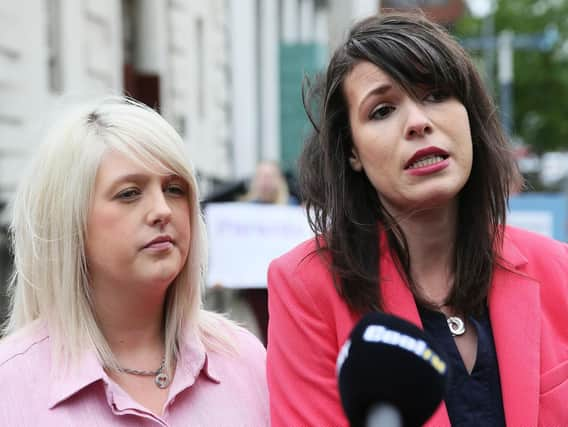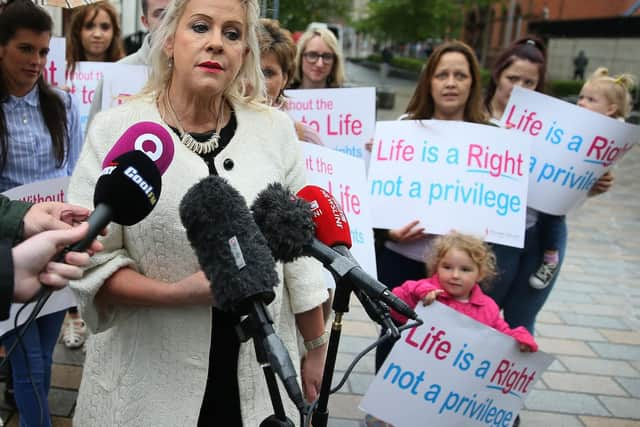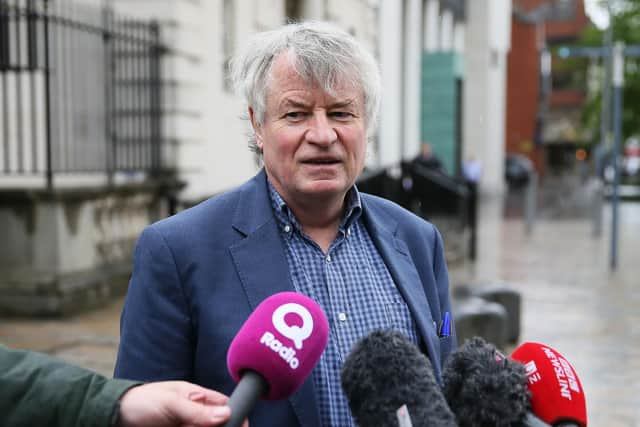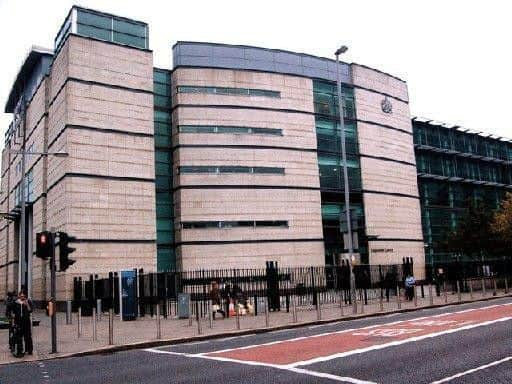Northern Ireland abortion reform for legislature to decide, say appeal judges


It said the complex moral and religious questions behind the issue should be determined by a legislature rather than a court.
The three judges allowed an appeal against a lower court's ruling that abortion legislation was incompatible with the UK's Human Rights Act obligations.
Advertisement
Hide AdAdvertisement
Hide AdUnlike other parts of the UK, the 1967 Abortion Act does not extend to Northern Ireland, where abortions are illegal except where the life or mental health of the mother is in danger.


Anyone who performs an illegal termination could be jailed for life.
Lord Justice Gillen said: "Abortion is a classic instance of the type of highly controversial issue touching on social, moral and religious policies on which there is no consensus either in Europe or, for that matter, in this jurisdiction.
"Such an issue requires Parliament to be allowed a wide margin of judgment."
Advertisement
Hide AdAdvertisement
Hide AdNorthern Ireland's senior judge, Lord Justice Declan Morgan, invited legal submissions on sending the case to the Supreme Court.


Northern Ireland Assembly members last year voted against legalising abortion in cases of fatal foetal abnormality.
It is an issue which has crossed traditional green and orange lines as representatives within both communities hold differing opinions.
A fatal foetal abnormality means doctors believe an unborn child has a terminal condition and will die in the womb or shortly after birth.
Advertisement
Hide AdAdvertisement
Hide AdThe Assembly has been in deep freeze for most of this year as talks to restore it continue.


Lord Justice Gillen added: "It is a matter of extraordinary complexity and moral entanglement on which views have shifted over the decades.
"Into this arena the court should fear to tread and ought to adopt an approach of balanced impartiality and well-judged caution if the appropriate constitutional balance is to be preserved."
He said the current law provided certainty and accountability and warned against the risk of doing a "disservice" to the cause of justice and potentially infringing on the division of powers between courts and the legislature.
Advertisement
Hide AdAdvertisement
Hide Ad"In deciding whether a fair balance has been struck between the right to respect for private life and the public interest in this jurisdiction in according respect to the moral values in the society as to the nature of life and the need to protect the life of the unborn, these considerations should act as a restraint on the court to the extent that a broad margin of appreciation must be accorded to the state."


He added: "I consider that a fair balance has been struck by the law as it presently stands until the legislature decides otherwise."
He said it was not for the court, rather than the legislature, to hasten a further shift in moral standards that may have been unfolding for some time.
The court took submissions from campaigners on both sides of the issue who have fought a long battle through lower courts.
Advertisement
Hide AdAdvertisement
Hide AdThe case centred on the current law which makes it an offence for a woman to abort with a fatal foetal abnormality or where the pregnancy arises through rape or incest.
The Human Rights Commission, an independent body established following the 1998 Good Friday Agreement, argued that the law's effect on women was incompatible with the respect for privacy clause of the European Convention on Human Rights.
The Stormont Executive's senior legal adviser, Attorney General John Larkin QC, with the Justice Department, argued that the commission did not have legal power to bring the case and said it failed to identify an unlawful act.


Submissions were made on behalf of women who had to travel to England for abortions.
Advertisement
Hide AdAdvertisement
Hide AdEarlier this month, the UK's highest court narrowly rejected an appeal by a mother and daughter for women from Northern Ireland to receive free abortions on the NHS in England.
Following the judgment, Bernie Smyth, director of the pro-life Precious Life lobby group, greeted cheering supporters outside court in Belfast city centre.
She said: "This has been a great victory here, a victory for democracy, a victory for the right to life.
"We have a statement that states very clearly that the right to life is granted neither by judges nor politicians but it is their duty to protect it.
Advertisement
Hide AdAdvertisement
Hide Ad"Today we can celebrate that fact that democracy has been respected."
Les Allamby, chief commissioner at the Human Rights Commission, said commissioners would consider a Supreme Court appeal.
"The judgment this morning is disappointing, however the judges were divided on a number of issues."
He added: "We also draw some comfort from the fact that all three judges mentioned the need to deal with this matter by the Northern Ireland Executive, or I guess, in the absence of a Northern Ireland Executive, by the Westminster Parliament, and therefore for us the issue is still very much in play."
Advertisement
Hide AdAdvertisement
Hide AdThe British Pregnancy Advisory Service said the ruling showed MPs must act to give women access to NHS care in England.
It urged them to support an amendment to Westminster legislation which would guarantee that.
A statement said: "These women are UK taxpayers yet our Health Secretary has thus far refused to grant them NHS-funded treatment out of respect for the politicians of Northern Ireland."